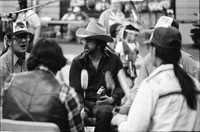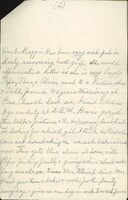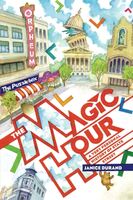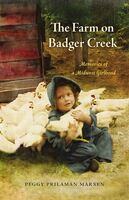Items
-
Obituary
Newspaper article listing obituaries for Eau Claire. Relevant entry reads: Mrs. William Hall. Mrs. Wm. Hall died yesterday in Detroit of pneumonia following influenza. She had lived in Eau Claire up to two months ago. Shea leaves a husband and child. Her parents, Mr. and Mrs. H. J. Schneider, and brother Arthur, live at Chippewa Falls; a brother Charles at Milwaukee; a sister, Mrs. R. E. Smith at Eau Claire. The funeral will be at the Lenmark undertaking parlors, 2 p.m. Saturday." -
Letter from Dora Schlegelmilch Barland to Agnes Barland McDaniel
Letter from Dora Schlegelmilch Barland to her daughter, Agnes Barland McDaniel. Relevant text reads: "Aunt Maggie has been very sick but is slowly recovering, had grip." -
The Magic Hour: A Very Personal History of State Street
Starting a store sounded like fun, sort of like putting on a play. I’d get to write the script, design the production, be the lead actor, hire people I liked, and direct the whole thing! After a year of answering to bureaucrats in my job as coordinator of the new State Street Mall, it would be wonderful to be the boss of everything. But what about afterward? What if the show wasn’t a hit? What if I couldn’t pull a salary out of it? Later in my career, I would understand that luck and timing were big factors in my success. In 1979, I had no grasp of national economics, but I did have a sense of something afoot. A strong new business cycle was brewing that few saw coming. I would open my store on State Street on the cusp of a retail boom at the height of the American Century, although I had only a faint sense of that yet. Nor did I have any idea that within a decade, it would all start to fall apart. -
The Farm on Badger Creek: Memories of a Midwest Girlhood
Peggy Prilaman Marxen grew up near the town of Meteor in northwestern Wisconsin’s Sawyer County, isolated by geography yet surrounded by close-knit extended family. Multiple generations of her family witnessed changes to rural Wisconsin that altered the fabric of their lives and the lives of all in their community, including the introduction of new farming techniques, school consolidation, and revolutions in transportation and technology. The family supplemented their subsistence herd of dairy cows by hunting, fishing, and selling timber and maple syrup. For many years, her home, like those of her neighbors, lacked indoor plumbing, electricity, and a telephone. As a young child, Peggy attended a one-room schoolhouse and walked, biked, or sledded the three miles to school and back, no matter the weather. With a lyrical style that mixes nostalgia with humorous anecdotes, Marxen traces her family’s story through the best and worst of times. The Farm on Badger Creek is a fitting tribute to her settler ancestors and a way of life now gone— and a celebration of the hardy people who carve out a life in our nation’s rural communities.





